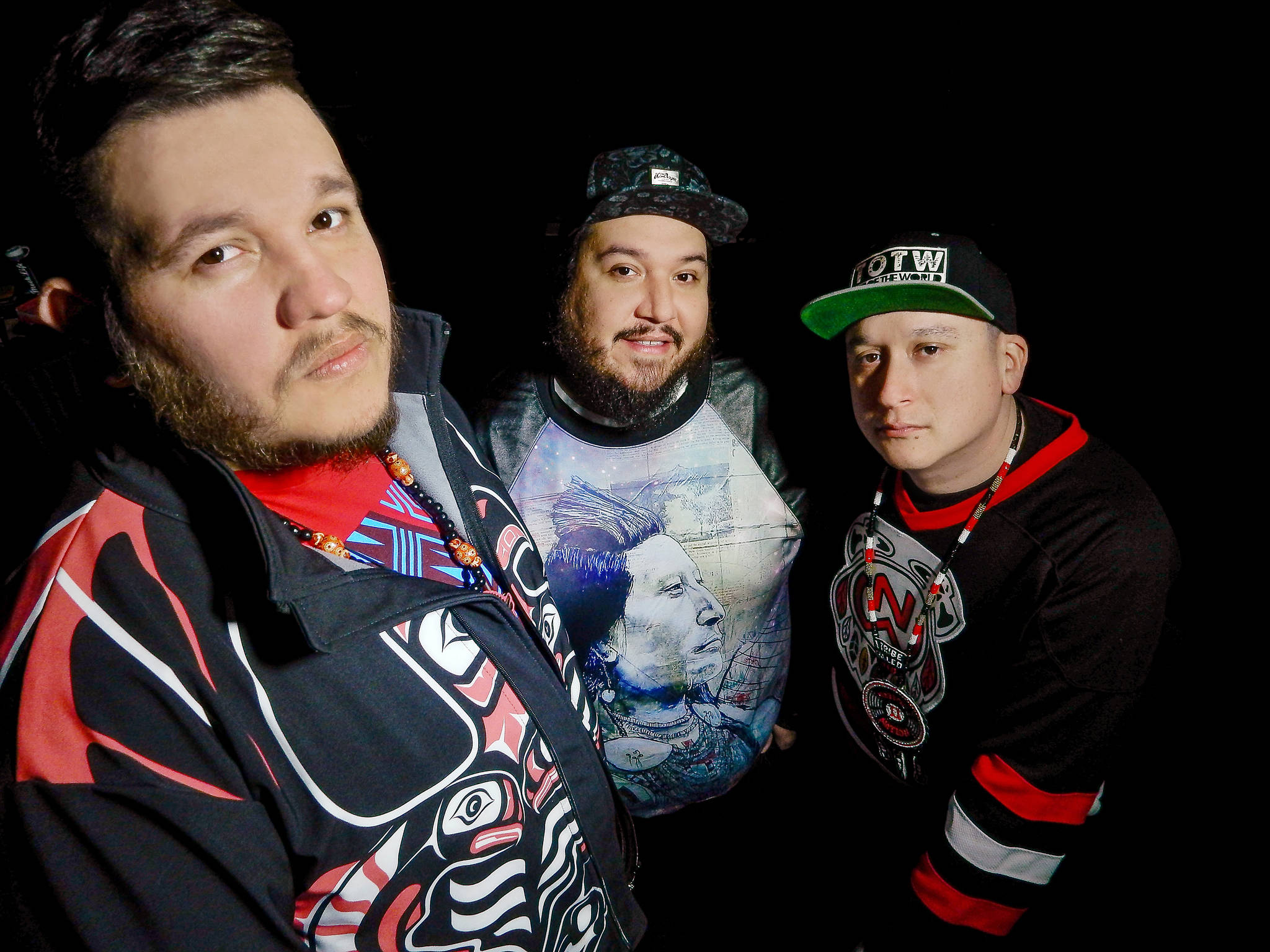A Tribe Called Red, a Canadian indigenous DJ group from Ottawa, Ontario, will be taking the stage of Centennial Hall on Oct. 19.
Members Ian Campeau “DJ NDN” of the Nipissing First Nation, Tim Hill “2oolman” of the Six Nations of the Grand River, and Ehren Thomas “Bear Witness” of the Cayuga First Nation will put on a show featuring their unique blend of traditional powwow vocals and drumming with electronic music which has been called powwow-step, a term originating from one of the group’s early singles.
“We’re super excited to be coming back to Alaska and to Juneau for the first time. Our last trip to Alaska was really special. We met a lot of really amazing people,” Bear Witness said.
There were a number of indigenous DJs in Ottawa, Bear Witness said, but they had never thought to come together for a show focused on the indigenous community until sometime in 2008. The show had a positive reaction from the indigenous community, and seeing the desire for music like theirs, the group decided “we couldn’t stop doing it,” Bear Witness said.
Through changes in membership and name (originally called Red Handed – from early on they knew they wanted “red” in the group’s name), the group finally became known as A Tribe Called Red, homage to the hip hop group A Tribe Called Quest, whose fun, intelligent songs address social issues. Their name is also in reference to how powwow drum groups introduce themselves by saying “a tribe called” and then the name of their Nation, Bear Witness said.
“A Tribe Called Red is emblematic of the vitality and evolution of indigenous cultures. They are drawing from their ancient cultures but expressing aspects of their heritage in a new and compelling way that speaks to young people,” president of Sealaska Heriatge Institute Rosita Worl said in a press release. In partnership, SHI, the Juneau Arts and Humanities Council and KTOO have worked to bring A Tribe Called Red to Juneau.
The group has released three albums: “A Tribe Called Red,” “Nation II Nation,” and “We Are the Halluci Nation.” Their self-titled album, released in March 2012, was long-listed for Canada’s Polaris Music Prize and named one of the top 10 Canadian albums of the year. “Nation II Nation,” released in May 2013, was shortlisted on the Polaris Music Prize as one of the one of the best Canadian albums of the year, and won four of the Indigenous Music Awards for best group, producer, album and cover art (formerly known as the Aboriginal People’s Choice Music Awards). Their third album “We Are the Halluci Nation” was nominated for CBC Music’s Best Canadian Album of the Year, shortlisted again for the Polaris Music Prize, and recognized at the Juno Awards.
The Halluci Nation is not a real First Nation, but a concept A Tribe Called Red built their third album around. It was inspired by a poem written by the late Native American rights activist, musician and poet John Trudell. He had written and recorded himself reading two poems for the group, and the second one was “We Are the Halluci Nation.” The opening lines are: “We are the tribe that they cannot see / We live on an industrial reservation / We are the Halluci Nation.”
“I heard the Halluci Nation poem and I was like ‘Oh my god, here’s our story.’ …In that poem, he had written out everything that we needed for our story. So it was really an instant thing. Once we heard that poem we ran with it,” Bear Witness said, stating they had an artist design a crest to go along with the fictional Halluci Nation which became the album cover. When they returned to show Trudell what his poem had inspired, he responded “Thank you. You made the Halluci Nation real,” Bear Witness said.
“The Halluci Nation album for us was really us pushing ourselves to take what we were doing into a new space, to take the dance moves that we were doing and have it express more emotion than just backs and drops, and be able to tell a larger story through electronic music,” Bear Witness said.
That larger story was comprised of indigenous voices sharing the impact of colonization in the modern world. While the Halluci Nation is fictional, it is grounded in the true stories of indigenous people. A prominent story was of Chanie Wenjack, an Ojibwe First Nations boy who had been forced to attend a residential school. He decided to walk home and froze to death a few miles away. Joseph Boyden wrote a novella on this piece of Canadian history, and Boyden contributed a couple of spoken word tracks to the album.
“…we were using the idea of the Halluci Nation focus in a fantasy world and the real world, and it’s a way to connect that fantasy into a more contemporary time,” Bear Witness said.
The group is “itching” to get back into the studio, but the three are still dreaming of what their next album will be like, Bear Witness said. For now, they’re playing in Alaska. They have shows Tuesday, Oct. 17 and Friday, Oct. 20 in Anchorage, and squeezed in between they’ll be in Juneau on Thursday, Oct. 19, 7:30 p.m. at Centennial Hall. Native dance group Woosh.ji.een will open for the band in Juneau.
Tickets are being sold through the Sealaska Heritage Store, the Juneau Arts & Culture Center (JACC), and Hearthside Books. Prices range from $5 (child) to $35 (premium). Proceeds will cover the cost of producing, staffing, and promoting the event. The group’s tracks are available on their website at http://atribecalledred.com/music/.
• Clara Miller is Capital City Weekly’s staff writer. She can be reached at clara.miller@capweek.com.

